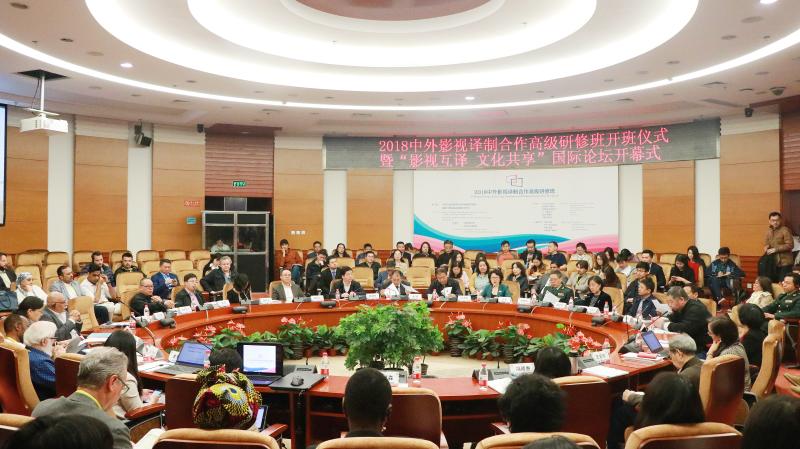Workshop deepens Chinese-foreign cooperation on audiovisual translation
- By Li Huiru
 0 Comment(s)
0 Comment(s) Print
Print E-mail China.org.cn, April 18, 2018
E-mail China.org.cn, April 18, 2018
The 2018 Sino-Foreign Audiovisual Translation & Dubbing Cooperation Workshop-Beijing was launched in the city on April 17 during the 8th Beijing International Film Festival.

The seminar, titled "Translating Films, Bridging Cultures," aims to further strengthen the cultural cooperation and exchange of Sino-foreign film and television, deepen mutual understanding between professionals in the translation and dubbing industries from various countries with their Chinese counterparts, promote further understanding of the development of contemporary film and television art in China and exchange translation methods and dissemination to improve cooperation on translation and dubbing.
The workshop has invited 40 foreign guests, including film festival chairpersons, directors of film and television organizations, translation experts from 24 countries, scholars and experts from more than 30 Chinese universities and more than 50 Chinese film and television organizations.
During the 5-day workshop, participants will participate in forums, film markets and road shows, and will work together on practices like experience-sharing and selected translation while exchanging ideas on the audiovisual industry.
There will be two workshops this year, one during the 8th Beijing International Film Festival and another during the 21st Shanghai International Film Festival.
Zhu Qi, deputy director of Bureau for External Cultural Relations, Ministry of Culture and Tourism, said at the opening ceremony that the workshop had built a high-level, sustainable, pragmatic, mutual-aid, authoritative and reliable exchange platform for everyone to promote high-level translation and dubbing cooperation on high-quality film and television works, thus achieving in-depth cultural exchanges.
Director of the International Cooperation Department, State Administration of Radio and Television Ma Li said in his speech that the native dubbing of a film shows respect for the local language and wins over a country's citizens. The film and television translator should be a traveler, singer and envoy promoting cultural exchange and mutual cultural understanding, turning film and television works into carriers of civilization appreciation and bridges that deepen understanding and trust.
Zhang Pimin, vice president of China Federation of Radio, Film and Television Social Organizations, said that in the context of the growing prosperity of film and television exchange between China and foreign countries, there is much space for development and demand concerning Chinese-foreign film and television dubbing and translation exchange. It is difficult for many excellent film and television works to enter the mainstream market and broadcasting platform of other countries, which can be attributed to lack of talent, communication and familiarity with overseas markets. Therefore, it is becoming more and more important to create barrier-free communication between Chinese and foreign film and television cultures through accurate translations and high-level communication.
Jiang Xufan, deputy party secretary of Communication University of China, said that with the expansion and development of Sino-foreign exchange and China's film industry, there is a clear gap between industry demand and availability of university-trained talent. It is of special urgency and importance to train people for film and television translation.
Three sessions of Sino-Foreign Audiovisual Translation & Dubbing Cooperation Workshop (SFATD) have been successfully organized since 2015. More than 200 experts from over 60 countries have been invited to China for study and research. They have established a mechanism for internationalized professional communication and cooperation on audiovisual translation across international borders. Until now, over 300 outstanding Chinese audiovisual products have been translated or dubbed into more than 20 languages, including English, French, Russian and Arabic, and released in over 70 countries, thanks to the various key audiovisual translation and dubbing projects launched by the State Administration of Radio and Television.
The seminar is hosted by the Bureau for External Cultural Relations, the Ministry of Culture and Tourism of the People's Republic of China and the International Cooperation Department under the State Administration of Radio and Television. It is presented by the Communication University of China and Chinese Culture Translation and Studies Support Network (CCTSS) and sponsored by the Committee of Beijing International Film Festival.






Go to Forum >>0 Comment(s)